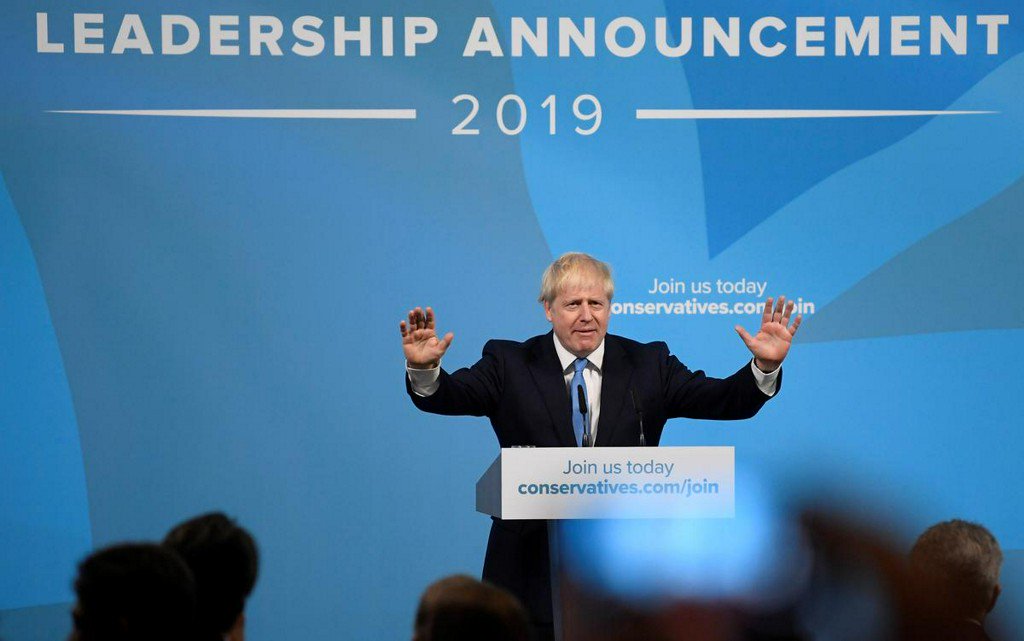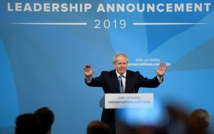According to a book last year by former White House aide Ben Rhodes, previous US president Barack Obama was one the earliest politicians to dub Johnson "Britain's Trump."
It's an epithet heard increasingly, often with resignation, from British politicians and voters.
In the final hustings with Conservative members in the party's leadership run-off, Johnson staged another stunt that few of his peers would dare to perform.
He held up a kipper - a smoked herring - and an ice pack to make a point about the supposed costs to business of EU food-packaging regulations. He blamed Brussels erroneously, according to EU officials.
Such details are unlikely to worry Johnson.
His supreme self-confidence, intellectual vanity and desire to please were forged in an outstanding education in which he rose to head boy of Eton, one of Britain's top private schools, and president of Oxford University's famous Oxford Union debating society.
Johnson, 55, loves to quote British wartime leader Winston Churchill and the European classics, which he read at Oxford.
His booming voice, posh accent and mop of blond hair - recently trimmed in a prime ministerial makeover - make Johnson, known to many Londoners as Boris, or BoJo, instantly recognizable.
Johnson separated last year from his half-Indian wife, Marina Wheeler, with whom he has four children.
He has insisted in recent interviews that he will no longer discuss his private life, amid intense media focus following a row at home with his girlfriend, which was recorded by a neighbour and given to a newspaper.
The former journalist on the Times and the Telegraph was born Alexander Boris de Pfeffel Johnson in New York on June 19, 1964. He enjoyed a privileged, peripatetic childhood before Eton and Oxford.
Johnson was sacked by the Times in 1988 for fabricating a quote by a scholar, telling the Independent later it was his "biggest cock-up."
He moved to another pro-Conservative newspaper, the Telegraph, where his colourful reporting from Brussels raised more eyebrows.
Pascal Lamy, who was chief adviser to then-European Commission president Jacques Delors in the 1990s, said Johnson's reports "looked so jokey, so silly, so fake."
"He did what people 30 years later would call fake news and provocation," Lamy told the Financial Times this month.
Despite the doubts over his news reporting, Johnson was increasingly admired for his brave and witty writing, and eventually landed a plum role at the Spectator back in London.
But controversy continued as his articles criticized Islam, raised concerns about uncontrolled immigration and described African children as "piccaninnies" - a term for which he later apologized.
While still writing and editing for the pro-Conservative magazine, Johnson stood as a parliamentary candidate for the party, winning the safe seat of Henley in 2001.
He was sacked from the Spectator in 2005 but remained a member of parliament until he won the hearts of London's voters in a 2008 mayoral election.
Johnson returned to parliament in 2015, co-leading Conservative rebels to form the Vote Leave campaign, which helped secure a slim majority for Brexit in a 2016 referendum.
Vote Leave was criticized for whipping up anti-immigration sentiment during the often bitter campaigning and for making wild claims on how much money Britain could save by ending its financial contributions to Brussels.
"Boris is a wonderful character, but he's never been a detail man," pro-EU Chancellor of the Exchequer Philip Hammond told the Daily Mail in September.
During discussions on the potential economic impact of Brexit options, Johnson was only able to give motivational "we can do it" comments, with "no rebuttal of the arguments," Hammond said.
Johnson has previously been accused of encouraging Islamophobia, including by backing a controversial Conservative campaign against Labour's Sadiq Khan, who was elected London's first Muslim mayor to succeed Johnson in 2016.
He was defiant when the BBC challenged him last month on his propensity to stir controversy.
"If sometimes I say things that cause a fluttering in the dovecotes or plaster to come off the ceiling, if it gets people’s attention, if it interests them in politics, then I think that is no bad thing," Johnson said.
---------------------------------------------------------------------------------------------------------------------------------









 Home
Home Politics
Politics











